-
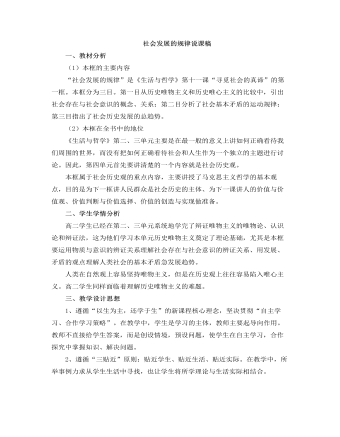
人教版高中政治必修4社会发展的规律说课稿(二)
“最佳实践者”活动凸显了“尊重劳动”的理念。运用历史唯物主义有关原理。说明为什么药“尊重劳动”。(10分)参考答案:①生产方式是社会存在和发展的基础,生产力是社会发展的最终决定力量,尊重劳动是尊重社会发展规律的必然要求;(3分)③人民群众是历史的创造者,尊重劳动是尊重人民群众社会实践主体地位的要求;(2分)④尊重劳动是以人民群众利益为最高价值标准的必然要求;(2分)⑤劳动者的价值通过劳动实现,尊重劳动是尊重实践、提高劳动者积极性和创造性的必然要求。(3分)七、教学反思本节课教学目标明确,教学重点、难点设置恰当,教学过程详略得当,教学过程流畅。教师充分利用时政热点和生活故事,创设情景,使学生融入教学活动过程之中,充分发挥了学生的主体作用,在体验中提高了认识能力和知识水平,促进了学生的理解能力、思维能力和解决问题的能力,促进了学生的发展。
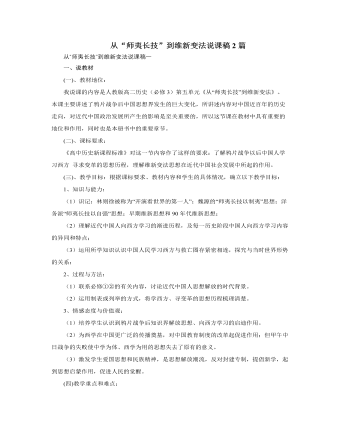
人教版高中历史必修3从“师夷长技”到维新变法说课稿2篇
(一)、教材地位:我说课的内容是人教版高二历史(必修3)第五单元《从“师夷长技”到维新变法》。本课主要讲述了鸦片战争后中国思想界发生的巨大变化,所讲述内容对中国近百年的历史走向,对近代中国政治发展所产生的影响是至关重要的,所以这节课在教材中具有重要的地位和作用,同时也是本册书中的重要章节。(二)、课标要求:《高中历史新课程标准》对这一节内容作了这样的要求:了解鸦片战争以后中国人学习西方 寻求变革的思想历程,理解维新变法思想在近代中国社会发展中所起的作用。(三)、教学目标:根据课标要求、教材内容和学生的具体情况,确立以下教学目标:1、知识与能力:(1)识记:林则徐被称为“开演看世界的第一人”;魏源的“师夷长技以制夷”思想;洋务派“师夷长技以自强”思想;早期维新思想和90年代维新思想;
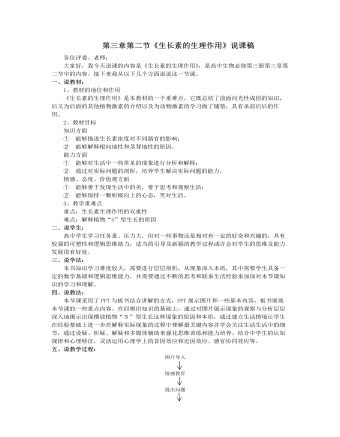
人教版高中生物必修3第三章第二节《生长素的生理作用》说课稿
强调重力对生长素分布的影响,为下面的内容讲解做铺垫,明确植物出现向光性与生长素分布不均有关。复习旧知识,产生首因效应,巩固和加强记忆。通过植物向光性是生长素分布较多而促进生长,进而提出“对于植物来说,生长素是不是越多越好”这个问题,引发思考,锻炼思维。说明生长素浓度对不同器官产生的影响不同,让学生对这一情况有一个整体印象。结合数学知识逐步分析图上各点和各曲线的含义,引导学生得出不同器官对生长素浓度的敏感性顺序,为解释横放植物“S”型生长做铺垫。通过对曲线的分析,得出低生长素浓度起促进作用,高浓度有抑制作用这种双重性,并得出其双重性表现。通过以上的分析和总结,对横放植物“S”型生长进行解释,达到首尾呼应的效果。采用“蒙太奇”手法,引申到“太空中,横放植物将会如何生长”这个问题,引发学生的联想和思考,以这种提问方式结课为下节课的开课做了铺垫,掌握了主动权。
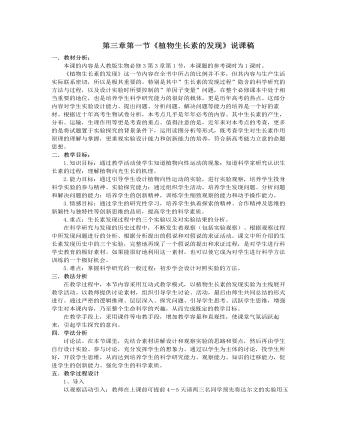
人教版高中生物必修3第三章第一节《植物生长素的发现》说课稿
(5)根据实验的第五部分——验证性实验结果,证实了达尔文关于植物向光性运动原因的假说――确实存在一种物质致使胚芽尖端产生了向光运动。这样通过多个实验的多媒体演示过程,强化学生的思维,最终在学生的大脑中形成科学研究过程的”条件反射”。为了使学生初步学会”设计对照实验的方法”,首先也利用多媒体的演示实验,并在其中特意设置一些”陷阱”,通过多次”请学生进入‘陷阱’”,来强化设计实验时应该控制的变量问题,从而在学生的认知领域里初步构建出设计对照实验的知识体系。3、归纳总结1934年,荷兰科学家郭葛等人从植物中分离出了这种能使植物产生向光性的物质,并确定它就是吲哚乙酸。这就真正从化学物质的角度证实了达尔文的假设。在能够从植物体中分离提取出生长素之后,要想知道:除了能使植物产生向光运动之外,生长素对于植物的器官还有什么作用?可以采用哪种方法来进行试验?
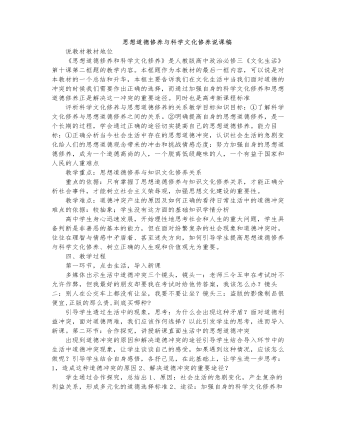
人教版高中政治必修3思想道德修养与科学文化修养说课稿
由此引导学生的深思,学生通过合作探究,帮助学生认识到不注重思想道德修养,即使掌握了丰富的科学知识,也难以避免人格上的缺失,甚至危害社会。进而总结出关系二:加强思想道德修养,能够促进科学文化修养。科学文化修养的意义播放感动中国人物徐本禹先进事迹短片。学生观看完视频后,思考:从徐本禹的事迹中,我们可以了解到我们加强科学文化修养的根本意义是什么?引导学生结合自身体会,发表各自见解,在此基础上帮助学生总结出,要使自己的思想道德境界不断升华,为人民服务的本领不断提高,成为一个真正有知识文化涵养的人,成为一个脱离低级趣味的人、有益于人民的人。知识点三:追求更高的思想道德目标根据教材110探究活动(思想道德的差异、反应人们世界观、人生观、价值观的差异)思考:用公民的基本道德规范来衡量这些观点,你赞成哪些观点?反对哪些观点?小组进行合作探究,引导学生根据公民基本道德规范对这些价值观进行评析。
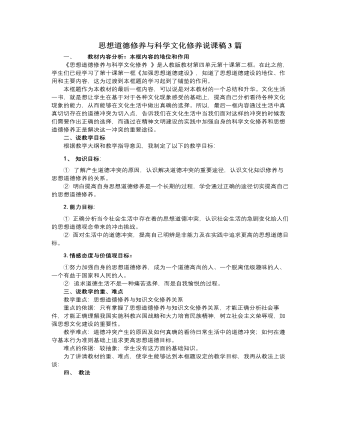
人教版高中政治必修3思想道德修养与科学文化修养说课稿3篇
(3)改造主观世界同改造客观世界的关系。改造客观世界同改造主观世界,是相互联系、相互作用的。改造主观世界是为了更好地改造客观世界,人们在改造客观世界的同时也改造着自己的主观世界。通过自觉改造主观世界,又能提高改造客观世界的能力。师:人们对自己的思想道德境界的追求,是永远止境的。让我们共同努力,在践行社会主义思想道德的过程中,不断追求更高的目标,像无数先辈那样,加入到为共产主义远大理想而奋斗的行列中吧!课堂小结通过本节课学习使我们认识到面对现实生活中的思想道德冲突,加强知识文化修养和思想道德修养,不断追求更高的思想道德目标的必要性;把握了知识文化修养与思想道德修养的含义及其相互关系;明确了我们应该和怎样追求更高的思想道德目标;认识到这是一个永无止境的过程。我们要脚踏实地,从现在做起、从点滴小事做起,不断提高知识文化修养和思想道德修养,追求更高的思想道德目标。
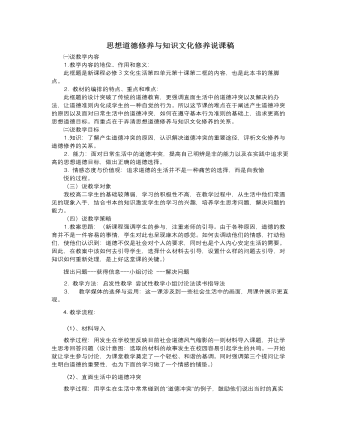
人教版高中政治必修3思想道德修养与知识文化修养说课稿
1.做学问之前首先学会做人2.知识文化修养和思想道德修养的关系三.追求更高的思想道德目标㈤ 说教学评价和反思:1.这节课主要是以学生为主体,老师为主导,让学生充分发表自己的看法,把理论的知识结合在实际的日常生活中,鼓励学生充分发表自己的意见,能调动学生学习的积极性,达到教学目的。这节课学生讨论,发言的机会很多,但由于我校的学生的基础薄弱,在发言时难免偏离老师引导的方向,甚至出现毫不相干的说法,由于本人经验不够此时如何去引导他们可能做的还不够好。2.新课程的教学,如何突破书本知识的局限,延伸更深层次的内容是一个难题。本节课在知识的处理上,把道德的重要性与道德的层次两个知识点补充了进去,目的是让学生在学习之前有一个情感的铺垫,从而更好地达到教学目标。
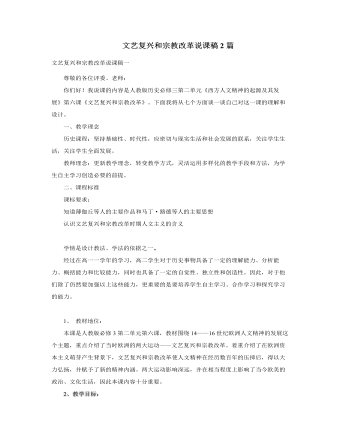
人教版高中历史必修3文艺复兴和宗教改革说课稿2篇
师:在科学发展过程中,前一个理论体系的不完善之处,往往是新的研究和新的发现的突破口。开普勒之后,意大利天文学家伽利略创制了天文望远镜,用更加精确的观察继续发展和验证哥白尼创立的新天文学理论。除了用望远镜进行天文观察以外,伽利略还开始进行自然科学的实验研究,哪位同学能给大家讲一讲伽利略在比萨斜塔上所作的关于物体自由下落的实验?生:(讲述这一实验)师:所以,伽利略在科学方面更加重要的贡献是奠定了近代实验科学的基础。(2)实验科学和唯物主义师:伽利略从实践上开辟了实验科学的方法,而英国唯物主义哲学家培根则从理论上阐述了实验科学的方法——归纳法。培根和伽利略同被称为实验科学之父,培根还有一句影响深刻的名言:“知识就是力量”,表明了他注重知识,尊崇科学的精神。我们再来概括一下意大利哲学家布鲁诺的唯物主义思想,是否有同学可以简述布鲁诺的生平事迹?
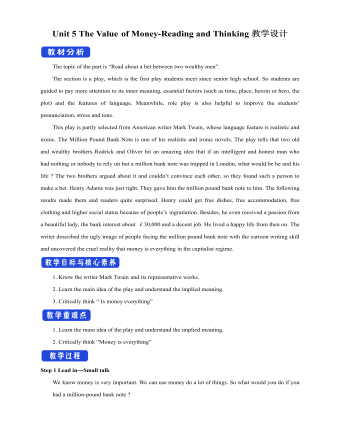
新人教版高中英语必修3Unit 5 The Value of Money-Reading and Thinking教学设计一
Everybody wants to get wealth.In today’s material world,making money or becoming wealthy symbolizes a person’s success and capability. Many people just make every effort, pay any price to attain greater wealth. With money,they can buy nice, large apartments in nice neighborhood. With money they can own luxurious cars. Wealth seems to bring all happiness in life.But is wealth the only road to happiness? Not really. There are many things in the world, which are beyond the means of money, such as friendship, love, health and knowledge. People are so preoccupied with struggling for money that they have no time or would not take the time to form or maintain friendship. What happiness can they feel living as lonely miserable creatures without love or friends in the world even if they accumulate tremendous wealth?In my opinion, people can’t do anything without money, but money is not everything. What money will bring you depends on your personal belief and goal in life. If you are kind enough to help others, especially the poor, money is a good thing to you. With it, you can do much more for the benefit of people and your country, and it will add to your own happiness. If you want money just for your own needs, you’ll never be satisfied or happy. In a word,you should have money spent for more people. Only then can money be the source of your happiness.Step 8 Homework4 students in a group, one acts Roderick, one Oliver, one servant and the fourth one acts Henry Adams, then listen to the tape, pay more attention to the difference between American English and British English in pronunciation, stress, tone.
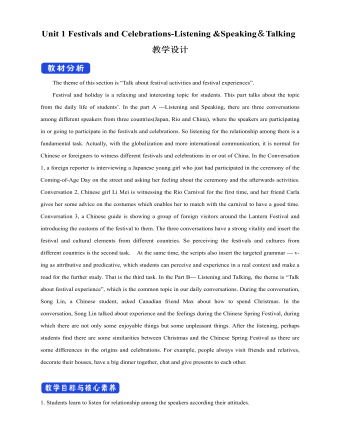
新人教版高中英语必修3Unit 1 Festivals and Celebrations-Listening &Speaking&Talking教学设计
The theme of this section is “Talk about festival activities and festival experiences”.Festival and holiday is a relaxing and interesting topic for students. This part talks about the topic from the daily life of students’. In the part A ---Listening and Speaking, there are three conversations among different speakers from three countries(Japan, Rio and China), where the speakers are participating in or going to participate in the festivals and celebrations. So listening for the relationship among them is a fundamental task. Actually, with the globalization and more international communication, it is normal for Chinese or foreigners to witness different festivals and celebrations in or out of China. In the Conversation 1, a foreign reporter is interviewing a Japanese young girl who just had participated in the ceremony of the Coming-of-Age Day on the street and asking her feeling about the ceremony and the afterwards activities. Conversation 2, Chinese girl Li Mei is witnessing the Rio Carnival for the first time, and her friend Carla gives her some advice on the costumes which enables her to match with the carnival to have a good time. Conversation 3, a Chinese guide is showing a group of foreign visitors around the Lantern Festival and introducing the customs of the festival to them. The three conversations have a strong vitality and insert the festival and cultural elements from different countries. So perceiving the festivals and cultures from different countries is the second task. At the same time, the scripts also insert the targeted grammar --- v-ing as attributive and predicative, which students can perceive and experience in a real context and make a road for the further study. That is the third task. In the Part B--- Listening and Talking, the theme is “Talk about festival experience”, which is the common topic in our daily conversations. During the conversation, Song Lin, a Chinese student, asked Canadian friend Max about how to spend Christmas. In the conversation, Song Lin talked about experience and the feelings during the Chinese Spring Festival, during which there are not only some enjoyable things but some unpleasant things. After the listening, perhaps students find there are some similarities between Christmas and the Chinese Spring Festival as there are some differences in the origins and celebrations. For example, people always visit friends and relatives, decorate their houses, have a big dinner together, chat and give presents to each other.
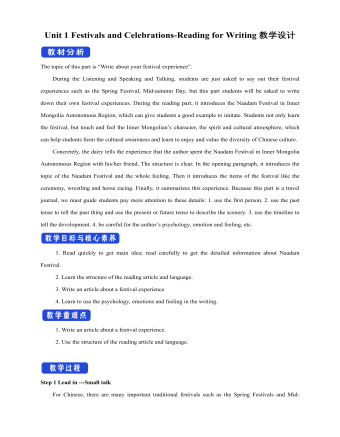
新人教版高中英语必修3Unit 1 Festivals and Celebrations-Reading for Writing教学设计一
The topic of this part is “Write about your festival experience”.During the Listening and Speaking and Talking, students are just asked to say out their festival experiences such as the Spring Festival, Mid-autumn Day, but this part students will be asked to write down their own festival experiences. During the reading part, it introduces the Naadam Festival in Inner Mongolia Autonomous Region, which can give students a good example to imitate. Students not only learn the festival, but touch and feel the Inner Mongolian’s character, the spirit and cultural atmosphere, which can help students form the cultural awareness and learn to enjoy and value the diversity of Chinese culture.Concretely, the dairy tells the experience that the author spent the Naadam Festival in Inner Mongolia Autonomous Region with his/her friend. The structure is clear. In the opening paragraph, it introduces the topic of the Naadam Festival and the whole feeling. Then it introduces the items of the festival like the ceremony, wrestling and horse racing. Finally, it summarizes this experience. Because this part is a travel journal, we must guide students pay more attention to these details: 1. use the first person. 2. use the past tense to tell the past thing and use the present or future tense to describe the scenery. 3. use the timeline to tell the development. 4. be careful for the author’s psychology, emotion and feeling, etc.1. Read quickly to get main idea; read carefully to get the detailed information about Naadam Festival.2. Learn the structure of the reading article and language.3. Write an article about a festival experience4. Learn to use the psychology, emotions and feeling in the writing.1. Write an article about a festival experience.2. Use the structure of the reading article and language.
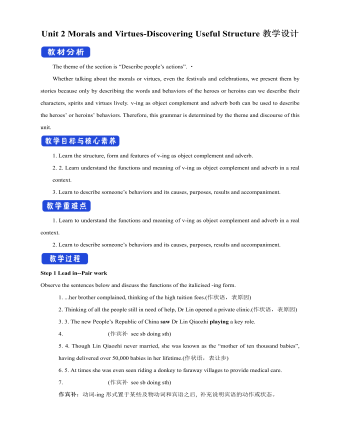
新人教版高中英语必修3Unit 2 Morals and Virtues-Discovering Useful Structure教学设计
1. 表示时间。Hearing these stories, I’m skeptical about the place. = When I heard these stories. . . 2. 表示原因。Not knowing his address, I can’t send this book to him. = Because/Since/As I don’t know his address. . . 3. 表示结果。His father died, leaving him a lot of money. =. . . and left him a lot of money4. 表示条件。Going straight down the road, you will find the department store. = If you go straight down the road. . . 5. 表示让步。Being tired, they went on working. =Although they were tired. . . 6. 表示行为方式、伴随情况或补充说明。He lay on the grass, staring at the sky for a long time. =. . . and stared at the sky for a long time注意:非谓语动词作状语时, 如所提供的动词不能和句子中的主语保持一致, 动词-ing形式必须有自己的逻辑主语, 通常由名词或代词来担任, 这就是独立主格结构。The last bus having gone, we had to walk home. (having gone的逻辑主语是the last bus, 而不是we)Weather permitting, the football match will be played on Friday. (permitting的逻辑主语是time, 而不是the football match)Step 7 Practice1. ________(study) hard, you are sure to get first prize. 2. People use plastic in their daily life, _______(leave) large amounts of waste. 3. ________(work) hard at your lessons, you are to succeed. 4. The old man, ____________(work) abroad for twenty years, is on the way back to his motherland. 5. ______________(finish) his homework, he was playing on the playground. Answers: 1. Studying 2. leaving 3. Working 4.having worked 5. Having finishedStep 8 HomeworkFinish the homework on Page 22.
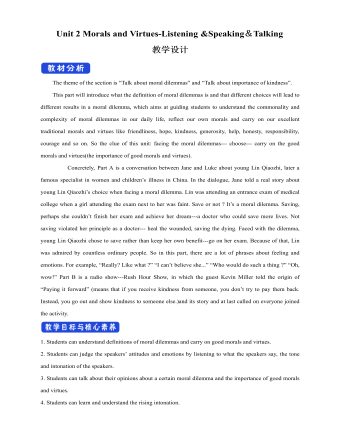
新人教版高中英语必修3Unit 2 Morals and Virtues-Listening &Speaking&Talking教学设计
Example:One day, a poor boy who was trying to pay his way through school by sending newspapers door to door found that he only had one dime(一角)left. He was so hungry that he decided to beg for a meal at the next house.However, he lost his nerve when a lovely young woman opened the door. Instead of a meal he asked for a drink of water. She thought he looked hungry so she brought him a large glass of milk. He drank it slowly, and then asked, “How much do I owe you?” “You don’t owe me anything,” she replied, “Mother has taught me never to accept pay for a kindness.” “Then I thank you from the bottom of my heart.” With these words, Howard Kelly left that house.Years later the woman became badly ill and was finally sent to the hospital in a big city. Dr. Howard Kelly, now famous, was called in. When he heard the name of the town she came from, a strange light filled his eyes. Dressed in his doctor’s clothes, Dr. Kelly went into her room and recognized her at once. From that day on, he gave special attention to her, and decided to do his best to save her life.At last the woman was saved. Dr. Kelly asked the business office to pass the final bill to him. He looked at it and then wrote something on the side. The bill was sent to the woman’s room. She was afraid to open it because she was sure that it would take the rest of her life to pay for it off. Finally she looked, and the note on the side of the bill caught her attention. She read these words: “Paid in full with a glass of milk, Dr. Howard Kelly.” Tear of joy flooded her eyes.
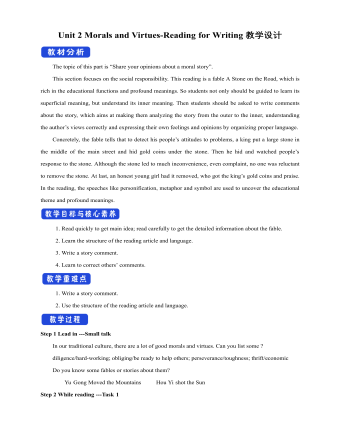
新人教版高中英语必修3Unit 2 Morals and Virtues-Reading for Writing教学设计
1. 这个寓言是一个关于一位国王古寓言。 The fable is an old fable about a king.2.作者用这个故事让读者对于社区的问题负有个人责任的必要印象深刻。The author used the story to impress upon readers with the need to take personal responsibility for problems in the community.3. 这个故事十分成功的实现了它的目的。The story was quite successful in achieving its purpose.Step 7 WritingPlease write a review of the story according the outline above.The fable is an old fable about a king who thought his people are lazy, so he put a large stone in the middle of the road and hides and waited to see if anyone will try to move it.The author used this story to impress upon readers with the need to take personal responsibility for problems in the community. The story was quite successful in achieving its purpose, and I liked it because it had a clear moral.However, while the moral of the story is clear, the actions of the king seemed pointless to me, because none of the characters in the story learnt anything. For this reason, I think there are better stories that can be used to impress upon people with the need for personal responsibility.Step 8 Pair workExchange drafts with a partner. Use this checklist to help your partner revise his/her draft.1. Does the writer give a short description of the story ?2. Does the description include the most important details of the story ?3. Does the writer give his or her opinion about the character or their actions ?4. Is the review well-organised ? 5. Does the writer use the -ing form as the adverbial correctly in the writing ?6. Are there any grammar, spelling, or punctuation errors ?Step 9 HomeworkPut up your revised draft in the classroom or read it to your class.
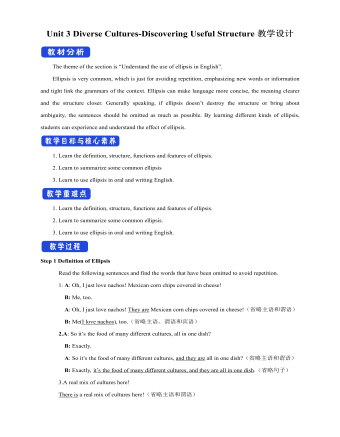
新人教版高中英语必修3Unit 3 Diverse Cultures-Discovering Useful Structure教学设计
Step 4 PracticeRead the conversation. Find out which words have been left out.Justin: Linlin, I’m going to Guizhou Province next month. I’m super excited! Any recommendations for places to visit?Linlin: Wow, cool! Guizhou is a province with a lot of cultural diversity. Places to visit...well, definitely the Huangguoshu Waterfall first.Justin: What’s special about the waterfall?Linlin: Well, have you ever heard of the Chinese novel Journey to the West ?Justin: Yes, I have. Why ?Linlin: In the back of the waterfall, you will find a cave, which is the home of the Monkey King.Justin: Really? Cool! I’ll definitely check it out.Linlin:And I strongly recommend the ethnic minority villages. You’ll find Chinese culture is much more diverse than you thought.Justin:Sounds great, thanks.Answers:Justin: Linlin, I’m going to Guizhou Province next month. I’m super excited! Do you have any recommendations for places to visit?Linlin: Wow, that’s cool! Guizhou is a province with a lot of cultural diversity. What are some places to visit in Guizhou ? Well, definitely the Huangguoshu Waterfall is the first place to visit in Guizhou Province.Justin: What’s special about the waterfall?Linlin: Well, have you ever heard of the Chinese novel Journey to the West ?Justin: Yes, I have heard of the Chinese novel Journey to the West . Why do you ask if I have heard of the Chinese novel Journey to the West?Linlin: In the back of the waterfall, you will find a cave, which is the home of the Monkey King from Journey to the West.Justin: That’s really true? It’s Cool! I’ll definitely check it out.Linlin:And I strongly recommend the ethnic minority villages on your trip to Guizhou Province. You’ll find Chinese culture is much more diverse than you thought it was.Justin:This all sounds great, thanks.
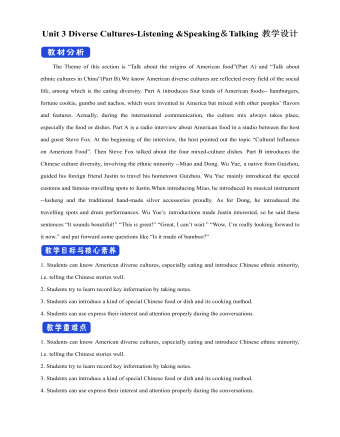
新人教版高中英语必修3Unit 3 Diverse Cultures-Listening &Speaking&Talking教学设计
1. In Picture 1 and Picture 2, where do you think they are from? How do you know?From their wearings, we can know they are from ethnic minority of China--- Miao and Dong.Picture 1, they are playing their traditional instrument lusheng in their traditional costumes.Picture 2. the girls are Miao because they wear their traditional costumes and silver accessory.2. In Picture 3, can you find which village it is? What time is it in the picture?It is Dong village. It is at night. Step 2 While-listeningJustin met a new friend while traveling in Guizhou. Listen to their conversation and complete the summaries below.Part 1Justin and Wu Yue watched some Miao people play the lusheng. The instrument has a history of over 3,000 years and it is even mentioned in the oldest collection of Chinese poetry. Then they watched the lusheng dance. Justin wanted to buy some hand-made silver/traditional accessories as souvenirs. He was told that the price will depend on the percentage of silver. Part 2They will go to a pretty Dong minority village called Zhaoxing. they will see the drum towers and the wind and rain bridges. They may also see a performance of the Grand Song of the Dong people.Step 3 Post-listening---TalkingWork in groups. Imagine Justin is telling some friends about his trip to Guizhou. One of you is Justin and the rest of you are his friends. Ask Justin questions about his trip and experience. The following expressions may help you.
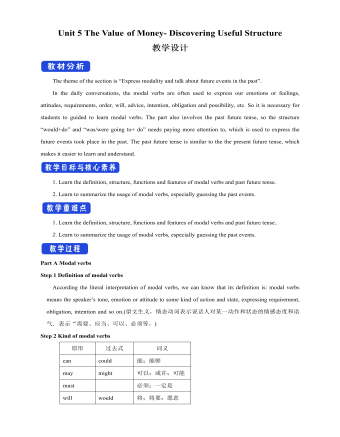
新人教版高中英语必修3Unit 5 The Value of Money- Discovering Useful Structure教学设计
Step 3 Meaning1. 过去将来时表示从过去某一时间来看将要发生的动作或存在的状态, 常用在宾语从句中。一般由“would/should +动词原形”构成。She hoped that they would meet again someday. 她希望将来有一天他们能再见面。2. was/were going to+动词原形: 表示过去将要发生或很有可能发生的动作, 常用于口语中, 表示预言、意图或者打算等。He was going to start work the following week. 他打算下星期开始工作。3. was/were about to do: 常用来表示即将发生的动作, “刚要/正要做……”。注意该结构不与任何时间状语连用。I felt that something terrible was about to happen. 我感到某种可怕的事情即将发生。4.was/were to do: 表示“曾计划做某事”, 如果表示“本来计划做某事, 动作没实现”, 则需用 “was/were to have done”。She said she was to have told me about the accident. 她说她本来想告诉我关于事故的事。5.Start, go, come, leave, see, meet等动词的过去进行时: 表示就过去某一时刻而言即将发生的动作。She was coming later. 她随后就来。I had just put on my overcoat and was leaving to visit a friend of mine. 我刚穿上外套要去看我的一个朋友。
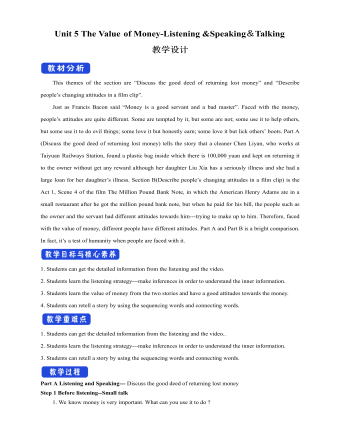
新人教版高中英语必修3Unit 5 The Value of Money-Listening &Speaking&Talking教学设计
4. A:We’d like to have someone to say a word at the beginning to welcome the group.B:↙Who?A:We thought that you or Dr.Johnson might do it.B用降调说Who,其意思是问,对方想让谁在开场时致欢迎词。Step 6 Pronunciation---Practice1. Listen to the short conversation and mark the intonation with ↗, ↙ or ↙, ↗. Then discuss with a partner what they intend to convey by using different intonation.Owner: You know what ?↗ It’s a million-pound bank note↙.Waiter 1: Really ?↗(question)Waiter 2: Really !↙(unbelievable and surprised)Waiter 3: Really ?!↙↗(first question then surprised)2. Listen to the conversations. Underline the parts that are stressed and mark the intonation. Then talk about the implied meanings of the responses with different intonations. Listen again and repeat.1) Henry: It’s a nice suit.Owner: Oh, it’s perfect!↙(The intonation means it is very suitable for Henry.)2) Henry: Well, that’s very kind of you.Owner: Kind, sir ?↗(what you said is not right) No, it’s kind of you. You must come whenever you want and have whatever you like. Just having you sit here is a great honour !!↙(welcome you to come again)3)Henry:Well, to be honest, I have none. Oliver:(happily) What luck!(excited) Brother↗, what luck!↙(It means “Didn’t you hear it?”)Henry: Well, it may seem lucky to you but not to me!↗(angry) If this is your idea of some kind of joke, I don’t think it’s very funny. Now if you’ll excuse me, I ought to be on my way.↙(If so, I would leave.)Roderick: Please don’t go↙...(hope Henry can wait for a moment)Part B Viewing and Talking---Describe people’s changing attitudes in a film clipStep 1 Before-listening---Tell the filmYou are going to watch part of the film The Million Pound Bank Note. Look at these photos and guess what happens in the film.
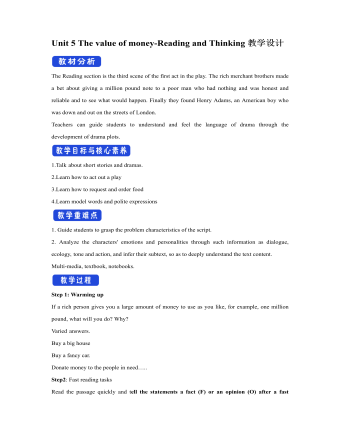
新人教版高中英语必修3Unit 5 The value of money-Reading and Thinking教学设计二
? Could you offer me some kind of work here?? I don’t want your charity, I just want an honest job.? Careless: I landed in Britain by accident.Step 7:Consolidation.? Find Henry? Roderick and Oliver were I .making a bet when they saw Henry, a poor young man. ? Know Henry? About a month ago, Henry was sailing and later he found himself carried out to sea by a strong wind. Fortunately, he 2.was spotted by a ship. And it was the ship that brought him to 3.England? Offer money to Henry ? Oliver and Roderick gave Henry a letter and told him that there was money in it. They 4.persuaded him to accept it, and made him 5.promise that it wouldn't be opened until 2 o'clock.Step 8:Language pointsa large amount of: a large quantity of; a great deal ofe.g. They bought a large amount of furniture before they moved their new house.make a bet: make an arrangement to risk money, etc. on an event of which the result is doubtful.e.g. We made a bet on the result of the match.permit sb to do something: allow somebody to do somethinge.g. My mother doesn’t permit me to ride in the street after it rained.by accident: as a result of chancee.g. I only found it by accident.stare at: look at somebody or something with the eyes wide open in a fixed gaze( in astonishment, wonder, fear, etc)to be honest: to tell you the truth; to be franke.g. To be honest, I don’t think we have a chance of winning.Step7 Homework:What do you think will happen to Henry? Will the bank-note help him or get him into trouble?
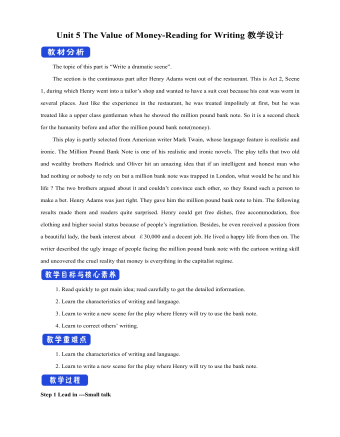
新人教版高中英语必修3Unit 5 The Value of Money-Reading for Writing教学设计二
2. 您能看到, 我头发太长了。You can see that my hair is much too long.3. 无论什么时候, 只要您想回来就回来。Please come back whenever you want.4. 您仅有很少的头发要理! You only have too little hair to cut !5. 为您服务是我的荣幸!It is my honour to serve you!Step 9 Writing(Henry is walking down the street when he sees a sign for a place that cuts hair. He decides to have it cut. )H=Henry B=BarberH: Good afternoon, I’d like to have my hair cut, if I may. (The barber looks at Henry’s hair and continues cutting another man’s hair. ) Er, I’d really like a haircut. As you can see it’s much too long. B: (in a rude manner) Yes, I can see that. Indeed, I can. H: Fine, well, I’ll have a seat then. (He sits in one of the barber’s chairs. The barber turns to look at Henry. )B: It’s quite expensive here, you know! Are you sure you can afford it?H: Yes. I think so. (After his hair is cut, the barber tells Henry how much he must pay. Henry shows the barber the bank note. )B: Why Mr. . . (looks shocked)H: Adams. Henry Adams. I’m sorry. I don’t have any change. B: Please don’t worry! (wearing a big smile) Nothing to worry about! Nothing at all! Please come back whenever you want, even if you only have too little hair to cut! It will be my honour to serve you!Step 10 Pair workExchange drafts with a partner. Use this checklist to help your partner revise his/her draft.1. Are all the elements of a play included and in good order ?2. Do the character use suitable language ?3. Are the stage directions clear and useful ?4. Is the plot clear and exciting enough ?





















